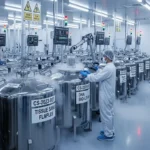Key Points
- Lab-grown meat is cultivated from animal cells in a controlled environment, producing muscle tissue identical to conventional meat.
- The production uses minimal land and water and generates fewer greenhouse gas emissions, helping to reduce deforestation and biodiversity loss.
- With scalable and efficient production, lab-grown meat can help meet the rising protein demand for a growing global population.
- Cultured meat promises a transformative, sustainable solution for feeding the world while conserving environmental resources and protecting biodiversity.
In futuristic gastronomy, a groundbreaking innovation is poised to revolutionize how we perceive and consume cultured meat. This emerging technology, lab-grown or cell-based meat, promises to address pressing challenges related to food sustainability, animal welfare, and environmental conservation.
Cultured meat is cultivated from animal cells, bypassing the need for traditional livestock farming. Scientists extract a small sample of cells from an animal, such as a cow, chicken, or fish, and cultivate them in a controlled environment. These cells multiply and turn into muscle tissue, yielding meat biologically identical to conventional animal-derived meat.
One of the primary advantages of cultured meat lies in its potential to mitigate the environmental impact associated with conventional meat production. Traditional livestock farming consumes vast resources, including land, water, and feed, generating significant greenhouse gas emissions and contributing to deforestation and biodiversity loss. In contrast, lab-grown meat production requires minimal land and water, produces fewer greenhouse gas emissions, and eliminates the need for deforestation.
Moreover, cultured meat has the potential to revolutionize animal welfare practices. By circumventing the need to raise and slaughter animals for meat consumption, the meat offers a cruelty-free alternative that aligns with ethical considerations and animal rights principles. This innovation represents a significant step toward creating a more compassionate and sustainable food system.
In addition to its environmental and ethical merits, cultured meat holds promise for addressing global food security challenges. As the world’s population grows, traditional meat production methods may struggle to meet increasing demand. The technology solution offers a scalable and efficient solution that can help alleviate pressure on the global food supply chain and ensure access to nutritious protein sources for a growing population.
While cultured meat is still in the early stages of development, significant progress has been made in advancing this technology. Several companies and research institutions worldwide actively engage in research and development efforts to commercialize lab-grown meat products. Some food technology organizations, including Mosa Meat, Eat Just (GOOD Meat), UPSIDE Foods, Believer Meats, Multus Biotechnology, and BioBetter Ltd., aim to reshape the global food system.
As technology evolves and production scales up, cultured meat can transform the future of food production, offering a sustainable, ethical, and scalable solution to meet the dietary demands of a rapidly growing population while safeguarding the planet’s resources and biodiversity.





